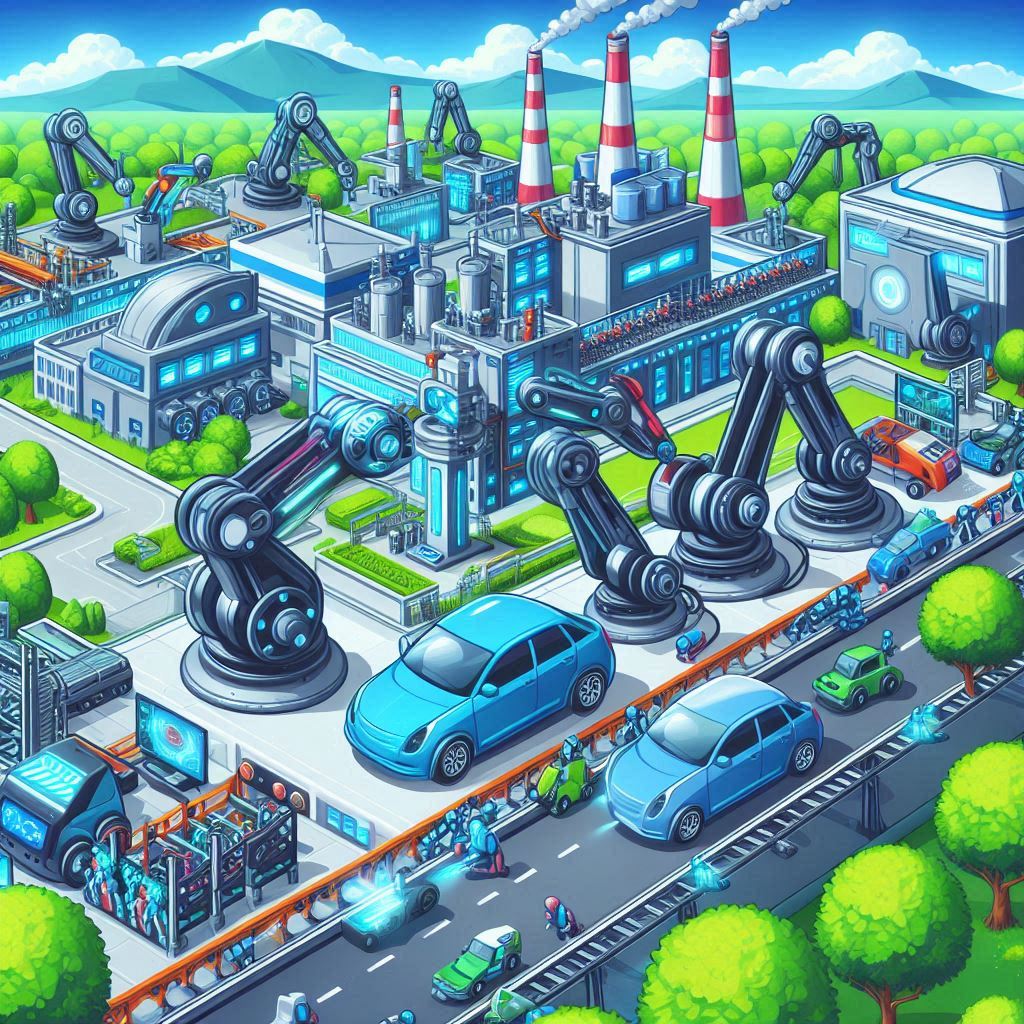People have realized the clear advantages of automating work since at least The Industrial Revolution. Facilitating better trade routes wasn’t enough. As people got more free time and wealth accumulation ensued, consumerism was born, and who’ll refuse the opportunity to sell more and make extra money?
Perhaps the greatest automation was born out of the creation of computers. Whirlwind I was created by MIT almost a Century ago, and the race to improve computer automation never stopped. The Internet gave access to virtually unlimited amounts of information, but it was the creation of personal computers that put everyday people’s access to that information within easy reach. Dell sold inexpensive desktops, and by the early 2000’s it was easier to find a home with a computer, than one without it. When Steve Jobs suddenly turned Apple from the designer’s alternative to PCs to basically a mini-computer in one’s hand, the automation revolution took another drastic turn. iPods, iPads, iPhones, and right behind it, the mostly open-source Android alternative, allowed people to quickly look up directions, listen to music, pull up a quirky fact, or check emails in seconds. Broadband computing made things far easier, and before too long, dialups were a thing of the past, and cable and fiber-optic sped up things to accommodate even the most impatient user.
On the ‘behind the scenes’ landscape, technologists discovered the advantage of backend automation frameworks, like J2EE and .net; front end frameworks, like jQuery and later React; then Hadoop’s Big Data system; and then DevOps’ implementations made everyone forget the sarcastic moniker of ‘point and click development’. If you can’t beat them, join them, and soon, Computer Science graduates stopped learning the very basics of their craft, with most not even knowing the meaning of ‘virtual binding’. Oddly, even the most experienced developers still struggled with Jenkins implementations, and the use of compiler was mostly relegated to low-level development tasks, like in manufacturing and telecommunications. Fast forward to the end of 2022 and OpenAI introduced ChatGPT, with everyone from Microsoft to Google throwing their hat into the GenAI ring in no time. Who cares about return on investment, when you are building a brand-new world?
Miso Robotics and others are tying Robotic Process Automation with French fries-making robots, trying to solve the minimum wage debate in favor of the future trillionaires, like Elon Musk. Bernie Sanders is no Karl Marx, plus most citizens now have iPhones and big screen TVs. Nobody wants a revolution. Nvidia’s chips are ultra expensive, data centers are running out of space, and yet, once quantum computing becomes available, GenAI will finally solve all of its issues and people will just enjoy life. Or something like that. For now, programmers are training their replacements in making smarter models.
Those are the highly technical advances, with generally just some of them reaching consumers directly. Away from the world of being a math whiz or a computer science expert, how did automation affect the day-to-day activities?
Long gone are the days, when you called a company and heard ‘How may I help you?’ from a human being. As much as Office Space and ‘Account payable, Nina speaking’ comes to mind, the human interaction was replaced by prompt-based electronic answering systems seemingly ages back. Need to make a payment? Want to give feedback? Need directions to the office? The odds are, the recording will direct you to the website or the app, with no chance to speak to a person. Once there, good luck finding the option to connect to a real person. If your issue is anything outside of the most basic, you’ll likely have to send an email with replies often completely irrelevant to your issue. Want to e-chat with a human? The incredibly long response time from an overwhelmed rep, handling multiple requests at once by copy and pasting prepared answers to all questions, will likely make you change your mind. Companies learned long ago that it’s easier to lose unhappy customers, than come up with custom-tailored solutions to a range of issues, likely requiring a far greater level of staffing.
Anyone trying to get a hold of Uber to explain an issue not described in quick answers knows, that swearing to never use the car share service again is illogical and likely very short-lived. It’s much quicker to dispute the charge with your credit card company, where it’s seen as ‘an acceptable loss’. With GenAI replacing more and more customer service options, hallucinations and overfitting seem to matter far less than the ability to cut costs.
In 2007 Dell was sued by New York State under Andrew Cuomo for long support wait times and often refusing to provide the services promised. Dell lost, and yet, if your brand-new computer from Dell is broken, you’ll be forced to go through long and tedious tech support calls, often taking weeks of testing and back and forth. If after many hours on the phone, over weeks of not giving up and trying to resolve your issue, your computer is still broken, guess what? The odds are, the 30-day window is closed and now you’ll get a ‘refurbished’ replacement, not the properly functioning brand new computer you purchased. Suddenly, instead of sending a pristine computer to a customer, Dell is sending a used and fixed up box, likely resulting in millions of dollars saved over time. At times, individuals take Dell to Small Claims Court, while Latisha James is too busy suing Donald Trump, instead of taking Dell to Court again. All other states’ Attorney generals are also focused on ‘bigger fish’, instead of trying to constantly defend consumer rights in Courts through class action. At times, they’re able to prove Dell’s malice. Dell ends up refunding the money paid, after many months wasted, while most others just give up and blame the injustice of corporate greed. When it’s time to buy another computer, Dell’s low prices and lack of viable competition causes the unpleasant memories to fade, and another Dell computer is bought. It’s the same with customer service. At almost every point, unless you are spending tens or hundreds of thousands of dollars and are ready to spend thousands or tens of thousands more on attorneys, Court is not the answer. The illusive desire, to explain your issue to a customer service rep and receive a fair response, fades in real time, generally muted by the excitement from ChatGPT and Apple Intelligence.
Most customer service reps were trained the same way, as ‘if’ statements. Find the closest thing to an answer and paste it into the chat box. Once you do it enough times, customers will just give up. If not, escalate it to the ‘next level of support’, which only emails and generally produces the same inaccurate answers. Taken that into consideration, frankly, LLMs should provide much better service.
Have you tried going to a vast majority of websites to get basic information just to get stuck trying to understand if you are looking at a direct irrelevant advertisement or a glorified advertisement of a company’s product or service? Pop-ups are so early 2000s, and their blockers no longer help eliminate irrelevant material.
Major cities lost much of their allure after the pandemic. Did people truly lose their ability to communicate without Zoom? Is remote work robbing everyone of the ability to hang out by the water cooler and share cool stories? Perhaps, everyone is just working more than ever, relying on an hour saved from commuting to work to get more done and not get laid off, understanding the barren job market? Perhaps, everyone forgot how to communicate, because expressing complex thoughts isn’t quite as efficient as clicking a mouse? Has the Pavlovian conditioning got people accustomed to losing a few bucks here and there and considering it an acceptable loss, sort of like credit cards do?
Most companies are happy to get rid of Diversity, Equity, and Inclusion (DEI), and stop trying to accommodate flaky kids, looking for support and empathy even from the very customers they are serving. A chatbot will not hang up on you, if you scream at it, forcing you to wait on hold again for the next useless rep, but it will also make you forget about being a human.
There is no turning back, when it comes to technological advances. Automation will continue till some version of The Matrix or Terminator is proven right, but for now, companies like Klarna are already replacing people with AI. The dystopian fantasy of robots working, while people just kick back and enjoy life, forgets that greed and lust for power are far more sought after than the desire to give. Yet, just as coastal cities falling into the ocean due to global warming, that scenario is still rather far away. For now, most are opting to consider iPhone 16 to engage in mindless late night social media scrolling, trying to pretend that there is more to life than work. For now, while Dell is keeping people on hold, Uber is ignoring dissatisfied customers, and credit cards are writing off minor losses, as acceptable, making up with high interest rates, people embrace automation.



